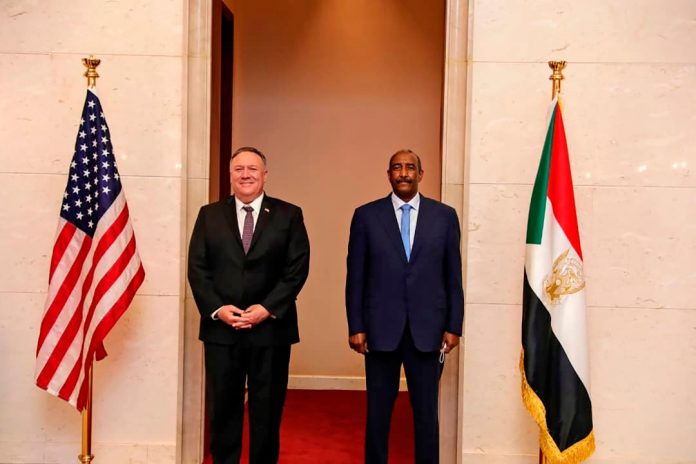Washington wants to go through Khartoum to convince Arab countries to normalize their relations with Israel, and through Algiers to fight terrorism on the continent.
Africa is back in the United States’ sights. While the head of U.S. diplomacy, Mike Pompeo, is engaged in a race against time to resolve his country’s dispute with Sudan before the U.S. presidential election, the head of the U.S. Military Command in Africa (AFRICOM), Stephen Townsend, visited Algeria on Wednesday, September 23.
“The United States has a once-in-a-lifetime opportunity to finally provide compensation to the victims of the 1998 Al Qaeda terrorist attacks on the U.S. embassies in Kenya and Tanzania,” Pompeo wrote in a letter to senators that AFP has learned of. “We also have a unique and narrow window of opportunity to support the civilian-led transitional government in Sudan, which has finally rid itself of the Islamist dictatorship,” he added.
At the heart of this issue, the inclusion of Sudan in the U.S. blacklist of states supporting terrorism. This sanction, synonymous with hindering investments for the country, dates back to 1993. The crisis worsened with the attacks of 1998, which had caused more than 200 deaths. Omar al-Bashir’s Sudan had then become a pariah for hosting the head of Al Qaeda, Osama bin Laden.
In recent years, Washington changed its tone when the former Sudanese autocrat began cooperating in the fight against terrorism and playing the peace game in southern Sudan. The United States reconnected with Khartoum, already under former Democratic President Barack Obama, and then began a dialogue to remove Sudan from its blacklist. The revolution that swept away Omar al-Bashir in 2019 only accelerated the movement. Since then, Mike Pompeo has not spared his support for the transitional Prime Minister, Abdullah Hamdok.
Blacklist
But negotiations were stalled over the thorny legal issue of compensation for the families of the victims of the 1998 attacks. The Secretary of State now believes that a solution is in sight and has made it “one of his top priorities,” a spokeswoman for U.S. diplomacy told AFP. His “plan” provides for the payment by Khartoum, in an escrow account, of funds that will only be paid conditionally to the United States to compensate the plaintiffs. U.S. media have cited the total amount of 335 million dollars (about 287 million euros).
Among these conditions are the removal of Sudan from the anti-terrorist blacklist and the adoption of a law proclaiming a “legal peace” with Khartoum, to avoid the risk of new lawsuits. In his letter, Mike Pompeo lobbied the U.S. Congress to pass this provision. “This law must come into force by mid-October at the latest in order to guarantee the payment of compensation to the victims as soon as Sudan is removed from the list of states supporting terrorism”, which will occur “very likely” by the end of October, he explained. That is to say, before the American presidential election of November 3. Within the government, however, there are concerns about resistance from some influential Democratic senators.
Why such eagerness on the part of a Secretary of State who is otherwise uninterested in Africa? It is probably in the name of another issue dear to the Trump administration. Mike Pompeo went to Khartoum at the end of August on a tour to convince Arab countries to normalize their relations with Israel. The camp of the president-candidate wants to capitalize on the historic agreements concluded under his aegis by the Hebrew state with the United Arab Emirates and Bahrain – a success that was missing from his diplomatic record, which is moreover favorable to Israeli interests and therefore likely to galvanize his evangelical electorate.
Abdallah Hamdok seemed to dash American hopes, saying that he had “no mandate” to decide this sensitive issue. But negotiations continue behind the scenes, with positions that are perhaps less fixed. General Abdel Fattah al-Burhane, head of the Sovereign Council in Sudan, who met with Israeli Prime Minister Benjamin Netanyahu in February, held three days of talks this week in Abu Dhabi with an American delegation. On the menu, of course, the exit from the blacklist, but also, according to the official Sudanese agency Suna, “the future of Arab-Israeli peace” and “the role that Sudan should play in achieving this peace”.
Regional Tensions
Parallel to this front, but further north on the continent, General Stephen Townsend, head of AFRICOM, paid a visit to Algiers Wednesday in a context of regional tensions, particularly in Libya and Mali, we learned from official sources. General Townsend, “accompanied by members of the U.S. Embassy in Algeria,” was received by the head of state, Abdelmadjid Tebboune, said a statement from the Algerian presidency, which does not disclose the content of the discussions. The senior U.S. officer also held talks with the Chief of Staff of the Algerian Army, General Said Chanegriha, and the Minister of Foreign Affairs, Sabri Boukadoum.
“We have a lot to learn and share with each other. Strengthening this relationship is very important to us,” the AFRICOM chief said, quoted in a statement from the U.S. Embassy in Algeria. “Algeria is a committed partner in the fight against terrorism. Weakening violent extremist organizations, malicious activities and strengthening regional stability is a mutual necessity,” Townsend said. This was the first visit to Algeria by an AFRICOM commander since 2018.
Algeria, which fears the risks of instability on its borders, is trying to reactivate its role on the regional diplomatic scene and is trying to take on a mediating role in the crises in Libya and Mali.
Source: Le Monde































